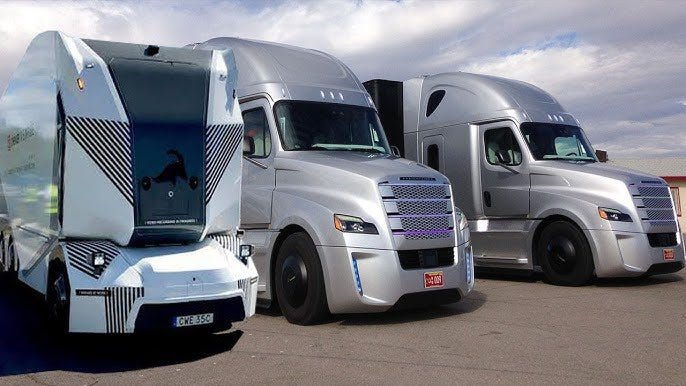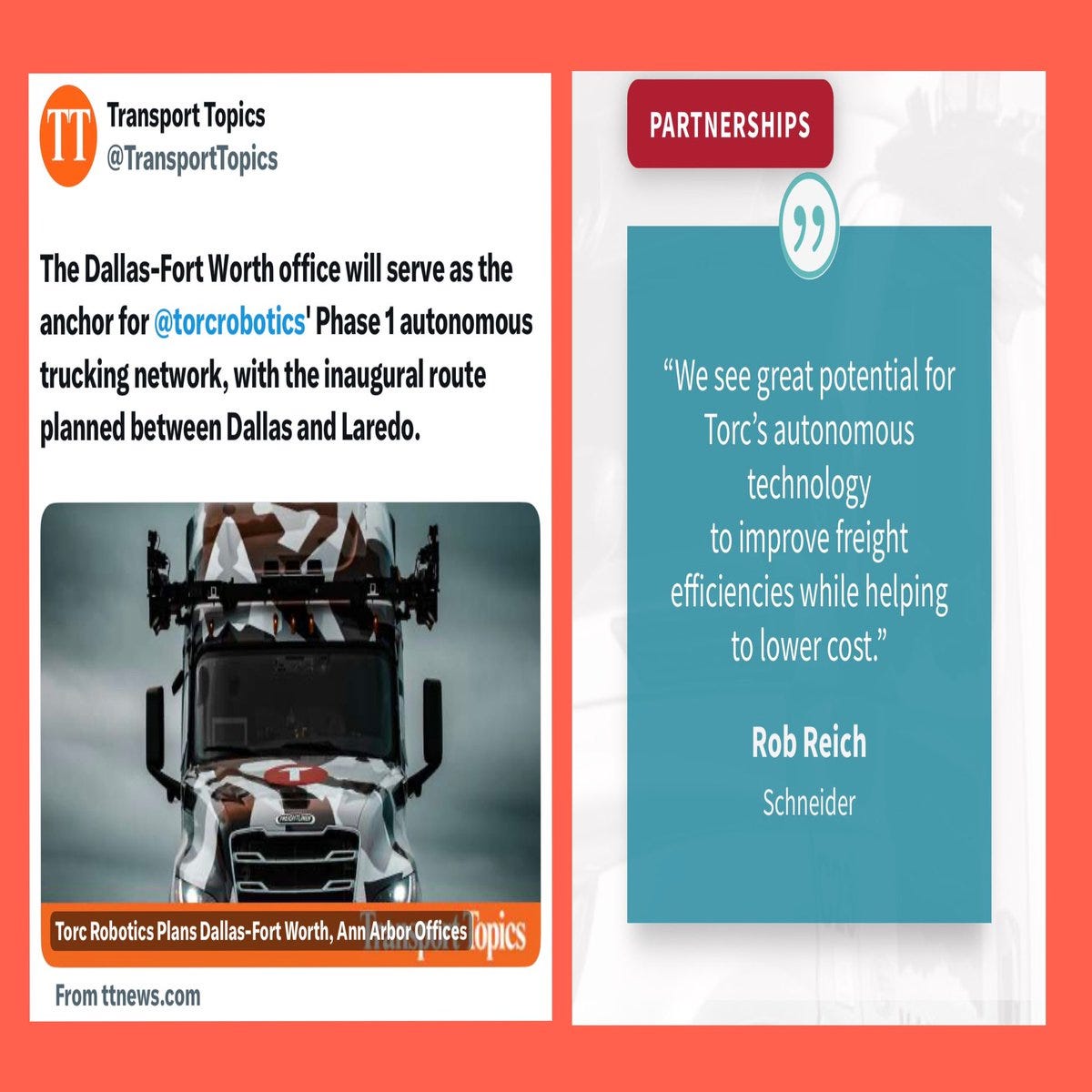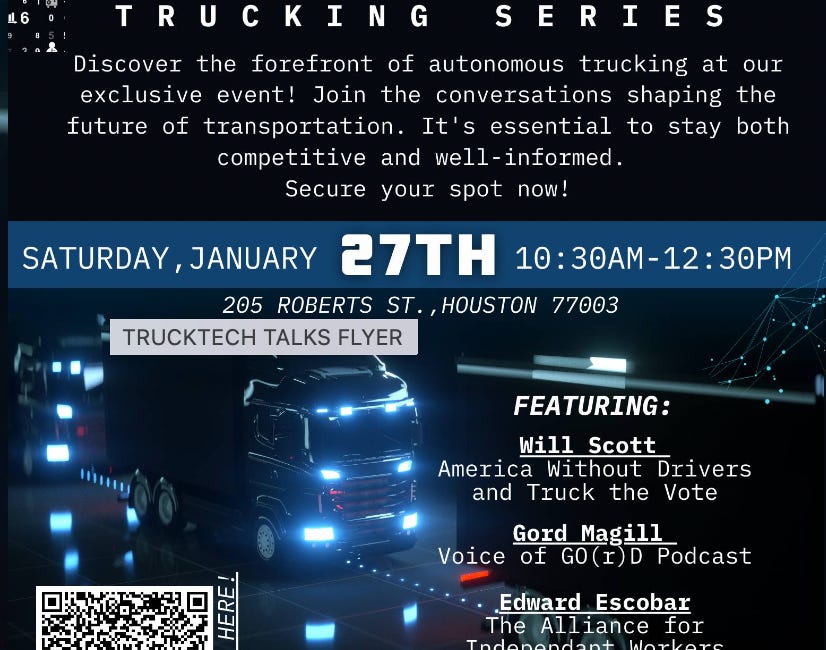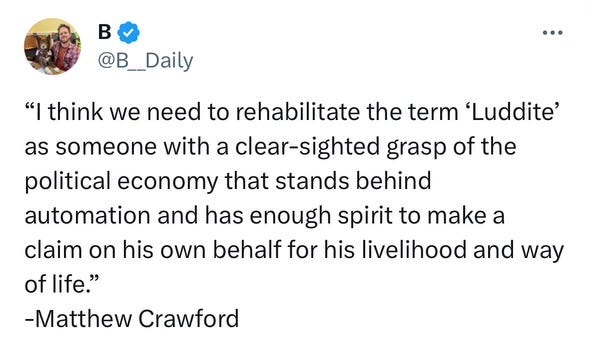Autonomous Truck Technology Guest Post
Two short missives from colleague and collaborator Will Cook.
Friend of this Substack and frequent guest of the Voice Of GO(r)D podcast, Will Cook, founder of America Without Drivers and a 34 year veteran of the industry, has made a few short posts this week, and I present you two of them for your perusal.
I’m looking to organize another podcast roundtable with Will and some other drivers very soon, hopefully in time for Christmas. In the meantime, stay tuned, and enjoy these two missives.
————
The most pressing news that every driver, owner-operator, and trucking company should be aware of is the latest update on “driverless” semi-trucks. If journalists were to conduct thorough research, they would quickly discover that these “robot trucks” are more than just a futuristic concept—they are ready for the road. Companies like Kodiak and Aurora have perfected their autonomous vehicles, ensuring safe miles driven and implementing backup sensors, backed up by additional backup sensors. The groundwork has been laid: regulations are in place, and collaborations with law enforcement and customers have provided the necessary infrastructure for these trucks to operate.
These companies are already running freight for hire, delivering goods on time and with safety drivers behind the wheel. The only thing standing in their way is the green light from the FMCSA and DOT, which are heavily influenced by the current administration. The Southern Corridor could, with the flip of a switch, become inundated with “robot trucks,” displacing thousands of drivers who currently earn between $70,000 and $120,000 a year.
The potential for displacement is not just a theory; it is a reality that could happen at any moment. For over five years, I have been sharing videos and evidence highlighting the advancements in autonomous trucking. Recent reports from global leaders in this field and autonomous vehicle builders emphasize that they are ready for regulatory approval. Yet, public representatives for these companies continue to misrepresent the work environment for the drivers they aim to replace, claiming the jobs are hard and stressful, with no one willing to do them. In reality, the “hub to hub” drivers—known in the industry as line haul drivers—are well-compensated, and there is often a long list of applicants waiting for these positions.
Key Facts:
- **Kodiak Robotics** and **Aurora Innovation** are actively running commercial freight operations, with Kodiak perfecting their autonomous technology.
Kodiak Robotics - https://kodiak.ai/
- The **FMCSA** is developing regulations for autonomous vehicles, reviewing requests for operational testing.
FMCSA - https://www.fmcsa.dot.gov/
- A **McKinsey & Company** report estimates that automation could displace up to **3.4 million trucking jobs** by 2030.
- Surveys show that many truck drivers express concerns about job security as automation rises, as noted by the American Trucking Associations.
https://trucking.org
- The **Bureau of Labor Statistics** highlights that many trucking jobs remain appealing, with high job satisfaction and good pay.
It’s time to shine a spotlight not only on the emergence of robot trucks but also on the trucking industry’s news outlets, which have failed to keep this critical information in the spotlight. Who is truly advocating for the drivers? While many profit off the hard work of drivers, few are willing to stand up for their interests. As we face this impending shift in the trucking landscape, it’s essential for all stakeholders in the industry to be informed and proactive. The future of many livelihoods hangs in the balance, and it’s crucial that we rally together to ensure that the voices of drivers are heard and valued in the face of this technological advancement.
Will Cook, December 2, 2024
————
Are Autonomous Companies and Regulators in Collusion? As the autonomous trucking industry gains momentum, companies like Torc Robotics, Aurora, and Kodiak are making headlines with key Texas routes. Torc is set for Dallas to Laredo, Aurora for Dallas to Houston, and Kodiak between Houston and Oklahoma. But are they collaborating with regulators and stockholders to limit public oversight?
The choice of routes raises questions: Is this effort to improve logistics or a calculated move to consolidate power? With increasing investments, there’s a risk that the focus may shift from public safety to profit margins.
The autonomous vehicle sector is complex, navigating a regulatory landscape still developing. Are these companies leveraging their influence to favor their operations at the expense of public interests?
As the Texas economy thrives, we must consider if these firms prioritize community needs and safety or merely chase market share. The lack of public discourse is concerning, as decisions made in secrecy could impact our transportation systems without adequate input.
The challenges facing autonomous trucking present an opportunity for meaningful dialogue. Issues like safety, regulatory compliance, and job displacement demand transparency. Are we heading toward a future where a few powerful entities dictate transportation, leaving the community voiceless?
With Torc, Aurora, and Kodiak making strategic moves, it’s essential to question their motivations. Are they committed to improving logistics, or is a troubling collaboration at play?
Will Cook, December 5, 2024
You can follow Will on Twitter - https://x.com/WillCookOnX
Will’s appearances on Voice Of GO(r)D -
America Without Drivers
In this episode of Voice Of GO(r)D, I speak with Will Cook, the man behind America Without Drivers, an organization whose aim is to have politicians and the public give deeper consideration to the effects and consequences of automated trucks entering our roads.
The Digital Highway - Questions about Autonomous Vehicles
Voice Of GO(r)D brings you the first in a series of Roundtable discussions on Autonomous Truck and Car technology, from the perspective of those whom will be most impacted by it - truckers, taxi drivers, and other on the road professionals.
Questions and Concerns with Autonomous Vehicles, Part 2 in a Series on The Digital Highway
Voice Of GO(r)D is back with a series within a series, both the second in this run of 5 episodes for National Truck Driver Appreciation Week, and the second in a series expressing questions and concerns with the rollout of Autonomous Vehicle Technology onto our streets and highways.
Driverless Trucks Are Already Here
Voice Of GO(r)D brings you a presentation about the realities of Autonomous (Driverless) Trucks in America, recently given to members of the Greater Houston Trucking Association.
LIVE Ask Us Anything on Automated Vehicle Technology
In case you missed it live, here is a recording of the Ask Us Anything roundtable discussion on Automated Vehicle Technology, held within The Arena on Reed Loustalot's Lost Fr8 Discord Server, which you can sign up for here.
Lest anyone feels Will and I are Luddites -
Questions, comments, suggestions, corrections, and Hate Mail, are both welcomed and encouraged - gordilocks@protonmail.com












I find it hard to believe the 3 aforementioned companies didn’t have a knowing path to sympathetic automated trucking legislation b4 investing 100s of millions. If u build it they will come. My current ability to earn $$ is in jeopardy.
Ponder this… By keeping the trucks in Texas, they avoid FMCSA oversight entirely. That’s intrastate rather than interstate, so the Feds have no say. Texas has their own set of rules for intrastate carriers and drivers. One aspect is that Texas allows 18 year old drivers to be fully licensed commercial drivers. Who do you think will be in these trucks earning far less than an experienced truck driver would accept? How much have JB Hunt and Amazon invested in autonomous trucks?